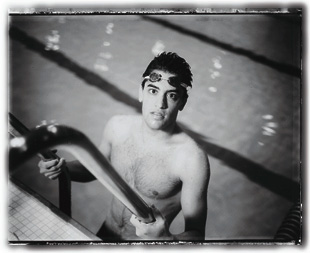![]()
Main Menu ·
Search ·
Current Issue · Contact · Archives · Centennial · Letters to the Editor · FAQs
![]()
Main Menu ·
Search ·
Current Issue · Contact · Archives · Centennial · Letters to the Editor · FAQs
U.S. players still dominate the staple sports of baseball, basketball, and football. But in sports like soccer, tennis, swimming, and rowing, "all-American" teams now draw on international pools of recruits. Many of these athletes gravitate to the United States to benefit from the world's best higher education.
 Butterfly swimmer Joaquim Ribeiro '99, who began swimming in his native Brazil.Photograph by Erik Fowke
Butterfly swimmer Joaquim Ribeiro '99, who began swimming in his native Brazil.Photograph by Erik Fowke
|
At the 1997 NCAA swimming meet, international students won six of 13 events. "You have all the top-ranked athletes in the world swimming here," says swimmer Joaquim Ribeiro '99, a butterfly specialist. "When you go to the NCAAs, it's like the world championships." In addition to Ribeiro, a Brazilian national, last year's Harvard men's team included Mike Kiedel '98 from Germany, Denis Sirringhaus '99, of Germany and South Africa, P.J. Thum '00 from Singapore, and Russia's Alex Kurmakov '99. Some in the swimming community have even suggested limiting athletic scholarships for international students, on the grounds that they are usurping the places of American swimmers.
International students comprised about half of both the men's and women's 1997 NCAA tennis draws. Dave Fish's tennis teams have included the likes of John Doran '00, who played on the Irish Davis Cup team, and Umesta Wallooppillai '95 of Sri Lanka, another Davis Cupper. (Of historical interest: the Davis Cup itself, which symbolizes one of the truly global competitions in sport, was given by Dwight Davis, A.B. 1900.)
In squash, the change to the international game has raised the value of foreign players, who are more advanced in that format. "Six or seven years ago, the all-American squash teams would be almost all U.S. athletes," says coach Bill Doyle. "Now you'll see a minimum of 70 percent foreign players."
Recruiting the far-flung jock poses a few new challenges. "It's a long trip from Bombay to see the campus for the weekend," says Doyle, who adds, "The Internet has helped immeasurably. I can tap into the Web page for the Australian Institute of Sport, click on squash, and reach Geoff Hunt, a former world champion who's now the Australian national junior coach. I can ask him, Do you have anyone who's very academically inclined who can play high-level squash?"
In the future, the Internet will be even more important, says Ribeiro, who got acquainted with Harvard swimming through the team's Web page. "I knew everything that was happening at Blodgett--meet results, coach and swimmer profiles, alumni addresses, e-mail addresses of the Harvard coaches and swimmers. I would e-mail swimmers and ask about the workouts, and got to be good friends with three or four of them. I know a lot of swimmers in Brazil who would really think about coming to the States, but a 10-minute phone call to the coach might cost $50. E-mail costs nothing. And the Web page helps avoid the language barrier. Many athletes don't speak English, but can read English, or get someone to translate."
Main Menu ·
Search · Current Issue · Contact · Archives · Centennial · Letters to the Editor · FAQs
![]()